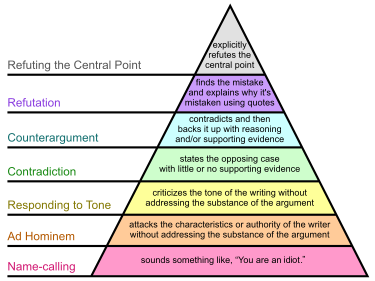Argumentation fallacies
I have for a long time been a fan of argumentation fallacy. Especially since I often hear people use it (most often subconciously). I started to think that this is due to different education levels, but it might also be due to logic differences. And without rediculing people (which can be interpreted as a Master suppression techniue), I ask people not to change topic instead. Here are some common mistakes:
Ad hominem
Wiki says:
Typically this term refers to a rhetorical strategy where the speaker attacks the character, motive, or some other attribute of the person making an argument rather than attacking the substance of the argument itself.This avoids genuine debate by creating a diversion to some irrelevant but often highly charged issue. The most common form of this fallacy is "A makes a claim x, B asserts that A holds a property that is unwelcome, and hence B concludes that argument x is wrong".

Character assassination
Wiki says:
Characer assassination is a deliberate and sustained effort to damage the reputation or credibility of an individual. The term could also be selectively applied to social groups and institutions. Agents of character assassinations employ a mix of open and covert methods to achieve their goals, such as raising false accusations, planting and fostering rumors, and manipulating information.
Association fallacy
Wiki says:
An association fallacy is an informal inductive fallacy of the hasty-generalization or red-herring type and which asserts, by irrelevant association and often by appeal to emotion, that qualities of one thing are inherently qualities of another. Two types of association fallacies are sometimes referred to as guilt by association and honor by association. This can be considered a part of Ad hominem fallacy.
Straw man
Wiki says:
A straw man is a form of argument and an informal fallacy of having the impression of refuting an argument, meanwhile the proper idea of argument under discussion was not addressed or properly refuted.One who engages in this fallacy is said to be "attacking a straw man".

Ridicule
Wiki says:
In a manipulative way to portray the arguments of, or their opponents themselves, in a ridiculing fashion.
Loaded question/fox shears
Wiki says:
A loaded question/fox shears complex question is a question that contains a controversial assumption (e.g., a presumption of guilt). he traditional example is the question "Have you stopped beating your wife?" Whether the respondent answers yes or no, they will admit to having a wife and having beaten her at some time in the past. Thus, these facts are presupposed by the question, and in this case an entrapment, because it narrows the respondent to a single answer, and the fallacy of many questions has been committed.

Victim playing
Wiki says:
Victim playing (also known as playing the victim, victim card, or self-victimization) is the fabrication or exaggeration of victimhood for a variety of reasons such as to justify abuse of others, to manipulate others, a coping strategy, or attention seeking.
Heap blame/put to shame
Wiki says:
To embarrass someone, or to insinuate that they are themselves to blame for their position.
Collective responsibility
Collective responsibility refers to responsibilities of organizations, groups and societies, political parties. Collective punishment is also practiced in the situation of war, economic sanctions, etc., presupposing the existence of collective guilt.Collective guilt, or guilt by association, is the controversial collectivist idea that individuals who are identified as a member of a certain group carry the responsibility for an act or behavior that members of that group have demonstrated, even if they themselves were not involved.
Guilt-shame-fear spectrum of cultures
Reason for shame and guilt can be complex, and depend on where you are and whom you talk to.
Wiki says:
In cultural anthropology, the distinction between a guilt society (or guilt culture), shame society (also shame culture or honor-shame culture), and a fear society (or culture of fear) has been used to categorize different cultures. The differences can apply to how behavior is governed with respect to government laws, business rules, or social etiquette. This classification has been applied especially to so called "apollonian" societies, sorting them according to the emotions they use to control individuals (especially children) and maintaining social order, swaying them into norm obedience and conformity. Anglo-Saxon England is particularly notable as a shame culture, and this trait survived even after its conversion to Christianity, which is typically a guilt culture.
Other fallaceis mentioned at:
- Appeal to Ignorance
- False Dilemma
- Slippery Slope Fallacy
- Circular Argument
- Hasty Generalization
- Red Herring Fallacy
- Tu Quoque (Also Ad Hominem)
- Causal Fallacy
- Fallacy of Sunk Costs
- Appeal to Authority
- Equivocation
- Appeal to Pity
- Bandwagon Fallacy
For more information about how to find out that you are talking to funny people, here is a list of cognitive biases:
Kommentarer
Trackback
